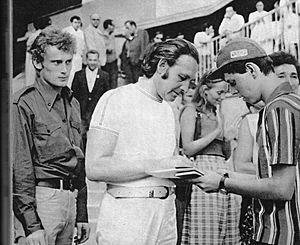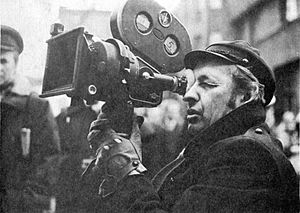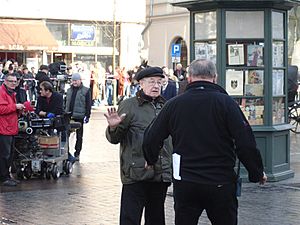Andrzej Wajda facts for kids
Quick facts for kids
Andrzej Wajda
|
|
|---|---|
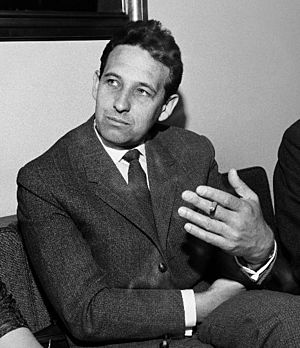
Wajda in 1963
|
|
| Born |
Andrzej Witold Wajda
6 March 1926 |
| Died | 9 October 2016 (aged 90) Warsaw, Poland
|
| Alma mater | National Film School in Łódź |
| Occupation | Film director, theatre director |
| Years active | 1951–2016 |
| Spouse(s) |
|
| Awards |
|
| Signature | |
 |
|
Andrzej Witold Wajda (6 March 1926 – 9 October 2016) was a famous Polish film and theatre director. He won many important awards, including an Honorary Oscar, the Palme d'Or, and honorary Golden Lion and Honorary Golden Bear awards. He was a key member of the "Polish Film School" movement.
Wajda was especially known for his three war films: A Generation (1955), Kanał (1957), and Ashes and Diamonds (1958). These films showed the struggles of people during and after World War II. He is seen as one of the world's most important filmmakers. His movies often explored Poland's history and how people tried to keep their dignity during tough times.
Four of his films were nominated for the Academy Award for Best Foreign Language Film: The Promised Land (1975), The Maids of Wilko (1979), Man of Iron (1981), and Katyń (2007).
Contents
Andrzej Wajda's Early Life
Andrzej Wajda was born in Suwałki, Poland. His mother, Aniela, was a teacher, and his father, Jakub, was an army officer. Sadly, Wajda's father was killed in 1940 during the Katyń massacre, a tragic event where many Polish officers were murdered.
In 1942, Wajda joined the Polish resistance movement, called the Home Army, to fight against the occupation of Poland during World War II. After the war, he first studied painting at Kraków's Academy of Fine Arts. Later, he went to the famous Łódź Film School, where many well-known Polish directors, like Roman Polanski, also studied.
Starting His Film Career
After learning from director Aleksander Ford, Andrzej Wajda got the chance to direct his own movie. His first big film was A Generation in 1955. Around the same time, Wajda also started directing plays in the theatre.
He made two more important films that continued the anti-war themes from A Generation:
- Kanał (1957) – This film won a special award at the Cannes Film Festival in 1957.
- Ashes and Diamonds (1958) – This movie starred Zbigniew Cybulski.
Wajda often used symbols in his films to tell deeper stories. For example, he might show a glass of liquor being set on fire to represent how youthful dreams were lost during the war. He also tried different styles, like the "new wave" style in Innocent Sorcerers (1960). In 1961, he directed Samson, which was about a Jewish boy trying to survive during the Nazi occupation.
In the mid-1960s, Wajda made The Ashes (1965). He also directed some films outside of Poland, such as Love at Twenty (1962) and Gates To Paradise (1968).
In 1967, the actor Zbigniew Cybulski died in a train accident. Wajda made Everything for Sale (1968) to express his sadness. This film was very personal and used a "film-within-a-film" style to tell a story about a filmmaker's life.
Gaining Artistic Recognition
The 1970s were a very busy and successful time for Wajda. He directed more than ten films during this period, including:
- Landscape After the Battle (1970)
- The Wedding (1972) – a film version of a famous Polish play.
- The Promised Land (1974) – This film was nominated for an Oscar.
- Man of Marble (1976) – This movie showed parts of Poland's history during the time of Stalinism.
- The Maids of Wilko (1979) – Also nominated for an Oscar.
Wajda continued to direct plays in the theatre, including famous works by authors like Dostoyevsky.
Wajda strongly supported the Solidarity movement in Poland, which was a big trade union fighting for workers' rights and freedom. He showed this support in his film Man of Iron (1981). This movie was a follow-up to The Man of Marble, and the real leader of Solidarity, Lech Wałęsa, even appeared in it as himself. Because of his involvement, the Polish government tried to shut down Wajda's film company. For Man of Iron, Wajda won the top award, the Palme d'Or, at the Cannes Film Festival.
In 1983, he directed Danton, starring Gérard Depardieu. This film was set during the French Revolution and showed how easily a revolution can turn into a time of fear and violence. For this film, Wajda won the César Award for Best Director. He also made other films in the 1980s, such as A Love in Germany (1983) and The Possessed (1988).
Career After 1990
In 1990, Andrzej Wajda received a special award from the European Film Awards for his amazing work over his lifetime. He was only the third director to get this honor. In the early 1990s, he was also elected as a senator in Poland.
He continued to make films about World War II, including Korczak (1990), which told the story of a Jewish-Polish doctor who cared for orphan children. In 1999, Wajda released the epic film Pan Tadeusz, based on a famous Polish poem.
A year later, at the 2000 Academy Awards, Wajda was given an honorary Oscar for his great contributions to world cinema. He later gave this award to Kraków's Jagiellonian University. In 2006, he received an Honorary Golden Bear award at the Berlin International Film Festival.
In 2007, Wajda released Katyń, a powerful film about the Katyń massacre, where his own father was killed. The movie also showed the difficult situation of families waiting for news about their loved ones. This film was nominated for an Oscar in 2008.
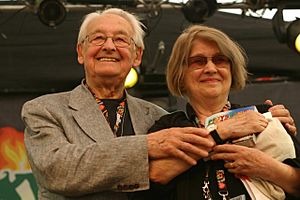
Wajda's film Sweet Rush (2009) was partly based on a short novel. His biography of Lech Wałęsa, called Walesa. Man of Hope (2013), premiered at the Venice International Film Festival. His very last film was Afterimage (2016), which was about a Polish painter.
Andrzej Wajda also helped create the Japanese Centre of Art and Technology in Kraków in 1994. In 2002, he started his own film school with Polish filmmaker Wojciech Marczewski, where students learn from famous European filmmakers.
Personal Life and Death
Andrzej Wajda was married four times. His third wife was the actress Beata Tyszkiewicz, and they had a daughter named Karolina. His fourth wife was Krystyna Zachwatowicz, a theatre costume designer and actress.
Wajda passed away in Warsaw on 9 October 2016, at the age of 90, due to lung problems. He was buried in Salwator Cemetery in Kraków.
Awards and Honours
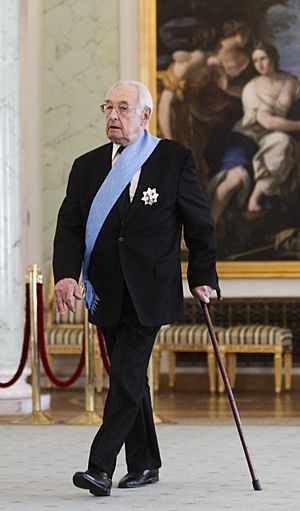
Andrzej Wajda received many important awards and honors throughout his life, recognizing his great work in film and theatre:
- 2012: Order of Merit of the Republic of Hungary
- 2011: Order of the White Eagle (the highest Polish award)
- 2006: Honorary Golden Bear for lifetime achievement at the 56th Berlin International Film Festival
- 2000: Academy Honorary Award from the Academy of Motion Picture Arts and Sciences (an Oscar for his life's work)
- 1997: Praemium Imperiale Award from Japan
- 1990: European Felix Award for lifetime achievement
- 1987: Kyoto Prize from Japan
- 1983: César Award for Best Director for Danton
- 1981: Palme d'Or at the Cannes Film Festival for Man of Iron
- 1957: Special Jury Prize at the Cannes International Film Festival for Kanał
Filmography
- A Generation (Pokolenie, 1955)
- Kanał (1957)
- Ashes and Diamonds (Popiół i diament 1958)
- Lotna (1959)
- Innocent Sorcerers (Niewinni czarodzieje, 1960)
- Siberian Lady Macbeth (Powiatowa lady Makbet, 1961)
- Samson (1961)
- Love at Twenty (L'amour à vingt ans, 1962)
- The Ashes (Popioly, 1965)
- Przekładaniec (1968)
- Gates to Paradise (Bramy Raju, 1968)
- Everything for Sale (Wszystko na sprzedaż, 1969)
- Hunting Flies (Polowanie na muchy, 1969)
- The Birch Wood (Brzezina, 1970)
- Landscape After the Battle (Krajobraz po bitwie, 1970)
- Pilate and Others (Pilatus und andere, 1972)
- The Wedding (Wesele, 1973)
- The Promised Land (Ziemia obiecana, 1974)
- The Shadow Line/Smuga Cienia (Smuga cienia, 1976)
- Man of Marble (Człowiek z marmuru, 1977)
- Without Anesthesia aka Rough Treatment (Bez znieczulenia, 1978)
- The Maids of Wilko (Panny z Wilka, 1979)
- The Orchestra Conductor (Dyrygent, 1980)
- Man of Iron (Człowiek z żelaza, 1981)
- Danton (1983)
- A Love in Germany (Eine Liebe in Deutschland, 1983)
- A Chronicle of Amorous Accidents (Kronika wypadków miłosnych, 1985)
- The Possessed (Les possédes, 1988)
- Korczak (1990)
- The Crowned-Eagle Ring (Pierścionek z orłem w koronie, 1992)
- Nastasja (1994)
- Holy Week (Wielki Tydzień, 1995)
- Miss Nobody (Panna Nikt, 1996)
- Pan Tadeusz (1999)
- The Condemnation of Franciszek Klos (Wyrok na Franciszka Kłosa, 2000)
- The Revenge (Zemsta, 2002)
- Katyń (2007)
- Sweet Rush (Tatarak, 2009)
- Walesa. Man of Hope (Wałęsa. Człowiek z nadziei, 2013)
- Afterimage (2016)
See also
 In Spanish: Andrzej Wajda para niños
In Spanish: Andrzej Wajda para niños


